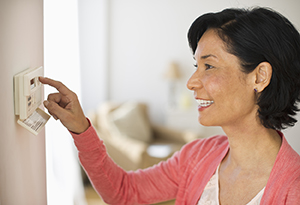Controlling Allergens: Pollen
Constant exposure to allergens means constant allergy symptoms. That’s why it's important to control or stay away from the allergens that cause your symptoms. If you are allergic to pollen, the tips below may help. The more you do to keep away from allergens, the better you’ll feel.
Pollen allergy
The pollen that causes allergies is often not the pollen carried from plant to plant by insects such as butterflies and bees. The types of pollen that most often cause allergies are made by plants (trees, grasses, and weeds) that don't have flowers. These plants make small, light, dry pollen granules. These are easily spread by the wind. They may even spread to places that have few plants, such as urban areas.
Controlling pollen
 |
| Keep windows closed, especially when pollen counts are high, and use air conditioning instead. |
Below are some tips to help you limit your exposure to pollen:
-
Check pollen counts and don't spend a lot of time outdoors when counts are high. Pollen counts tend to be higher during warm, dry weather. They also tend to be higher during early morning and late afternoon hours. In some areas, daily pollen counts are reported in the paper and on the radio. Daily pollen tracking apps can also be downloaded to electronic devices.
-
After spending time outdoors, bathe or shower, wash your hair, and change your clothes. Put these clothes in a part of the house near the door. This helps to reduce bringing pollen into the bedroom.
-
Stay indoors as much as you can on windy days.
-
Keep windows closed and air conditioning on, if possible, in your car and your home. Air conditioners filter air and also dehumidify. Change your air conditioning filters regularly.
-
Have someone else do gardening, yard work, or other outdoor chores. Masks are available if you have to be outdoors.
-
When your allergies are at their worst each year, try getting away to a place where your allergies won’t bother you as much. This might be a time to try to plan a vacation. Or to visit a friend or relative.
-
Talk with your healthcare provider about medicines that can help. Ask if it may be helpful to see an allergist.
Pollen allergy is seasonal
People have allergies only when the pollen to which they are allergic is in the air. Each plant pollinates more or less the same time from year to year. Exactly when a plant starts to pollinate depends on geographical location, not the weather. In mild areas, trees pollinate in the spring, grass in the middle of the warm season, and weeds in the fall leading up to the first frost. In warm places, pollination can occur any time of year.
The National Allergy Bureau (NAB) records pollen and mold levels from certified stations throughout the U.S. Track your geographic area by going to the NAB website at pollen.aaaai.org.